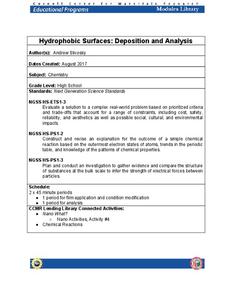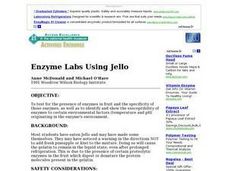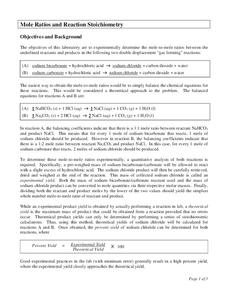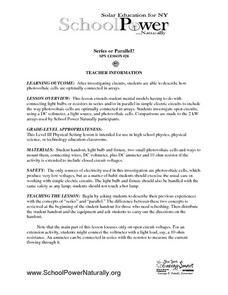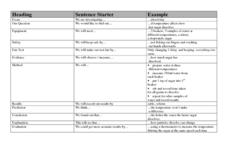Curated OER
Mystery Powder Lab
In this mystery powder worksheet, students determine the identify of 6 unknown samples by testing them with cabbage juice for pH, vinegar, iodine for starch and heat. Students determine the identity of the mystery powders using their...
Curated OER
What-Not-To-Do Laboratory
In this science and health worksheet, students analyze a detailed drawing of "What-Not-To-Do Laboratory." Students spot the many safety hazards and color the picture.
American Chemical Society
Energy Foundations
Only 10 percent of an incandescent bulb's energy is used to create light; the remaining 90 percent is heat. In the unit of activities, young chemists examine energy through hands-on activities, videos, discussions, and readings. Scholars...
Cornell University
Hydrophobic Surfaces—Deposition and Analysis
Couches, carpets, and even computer keyboards now advertise they are spill-resistant, but what does that mean? Scholars use physical and chemical methods to coat surfaces with thin films to test their hydrophobic properties. Then they...
American Chemical Society
Neutralizing Acids and Bases
Most things naturally strive for balance, and acids and bases are no exception. Neutralization of acids and bases allows scholars to explore the color changes associated with the pH scale. After this exploration, pupils neutralize two...
American Chemical Society
Why Does Water Dissolve Sugar?
Did you know that if you wait long enough, the M on the outside of an M and M will float to the surface when submerged in water? Learners observe the sugar coating of an M and M while it is dissolving in water. They explain how this...
Curated OER
Confident Commute: Increasing Safety for Teen Drivers
Students brainstorm possible causes for motor vehicle accidents involving teen drivers. In this biology lesson, students study national data regarding teen driving behaviors. They create awareness materials to help promote safe driving...
Curated OER
Coin Lab
In this experimental design worksheet, students experiment with three coins, a dropper and water. They determine how many drops of water they can put on each coin. They answer questions about their experiment and they design an...
Curated OER
Rate of Solution Lab
In this rate of solution worksheet, students determine how quickly a solute dissolves in a solvent by testing one independent variable such as temperature, particle size or the amount of stirring. Students design their experiments and...
Curated OER
Types of Chemical Reactions Lab
In this chemical reactions worksheet, students experiment with several different reactions and identify each as a single replacement, double replacement, synthesis, decomposition or combustion reaction. Students observe the changes in...
Curated OER
Enzyme Labs Using Jello
High schoolers test for the presence of enzymes in fruit and the specificity of those enzymes, as well as to identify and show the susceptibility of enzymes to certain environmental factors (temperature and pH) originating in the...
Curated OER
Relationships and Biodiversity Lab
In this relationships and biodiversity worksheet, learners investigate the relationships between 4 plants sample using 7 different tests. These include looking at structural characteristics of the plants, seeds and stems, using paper...
Curated OER
Chemical and Physical Changes Lab
In this chemical and physical change instructional activity, students conduct a variety of experiments with unknown solutions and make observations. Students determine if the properties of the solutions have changed and if there is...
Curated OER
Applied Science - Technology (5A) Lab
Fifth graders explore electromagnetic waves and light. For this light lesson, 5th graders draw the parts of a wave of the electromagnetic spectrum. They compare a flashlight to a laser to see how the light looks when shined through...
Curated OER
Ionic vs. Covalent Compounds Lab
In this ionic and covalent compound activity, learners investigate the properties of three unknown substances in order to determine if they are ionic or covalent compounds. They write conclusions about their results.
Teach Engineering
Sugar Spill!
Sugar isn't good for you, but it's great for yeast! Scholars design an experiment to investigate how variables affect the rate of sugar consumption in yeast. The last installment of a nine-part Life Science unit considers how scientists...
Santa Monica College
Mole Ratios and Reaction Stoichiometry
Stoichiometry sounds complicated, but it really means the study of the amount of substances involved in a reaction. The sixth lesson plan in an 11-part series has scholars use stoichiometry to find the theoretical yield of a reaction....
Curated OER
Blast Off
In this physical science exploration, small groups place a piece of antacid tablet into a film canister and step back to time how long it takes for the top to pop. They repeat the activity, altering either the amount or temperature of...
Curated OER
Testing Leaves for Starch: the Technique
Like good scientists, kids often want to see first-hand why things are as they are; they can do just that in the starch-testing photosynthesis activity found here. Depending on the age of your pupils, you may wish to do the investigation...
Curated OER
Series or Parallel?
Physics classes that are studying electricity connect photovoltaic cells into both series and parallel circuits. Inquiry and critical thinking come into play as learners try to determine which circuit is more productive. They associate...
Teaching Ideas
Investigation Prompts
Get your class started with experimentation and investigation by providing sentence starters. This chart is made up of three columns. The first column lists steps of the scientific process and the second provides sentence starters for...
Curated OER
Using Photovoltaic Cells and Systems
This interesting document suggests nine different activities for shedding light on photovoltaic cells. A bit of background information is furnished for you, as well as many, many resource links. Listed for each activity are a learning...
National Renewable Energy Laboratory
Biomass: Biogas Generator
It's a gas. Middle schoolers build a biogas generator following the directions in this resource. After a few days of observation, they demonstrate that the gas given off by the decomposing manure is flammable. The activity concludes as...
Nuffield Foundation
Dissecting Lungs
Here is a lab activity where teens experience the respiratory system first-hand as they dissect lungs and identify key structures within the system. Although the website is written in British English with some slightly different verbiage...
Other popular searches
- Science Lab Safety Rules
- Physical Science Lab Safety
- Teaching Science Lab Safety
- Science Lab Safety Symbols
- Science Lab Safety Chart
- Science Lab Safety Contract
- Science Lab Safety Equipment
- Science Lab Safety Videos
- Science Lab Safety Activities
- Science Lab Safety Activites
- Safety in the Science Lab
- Science Lab Safety Song





